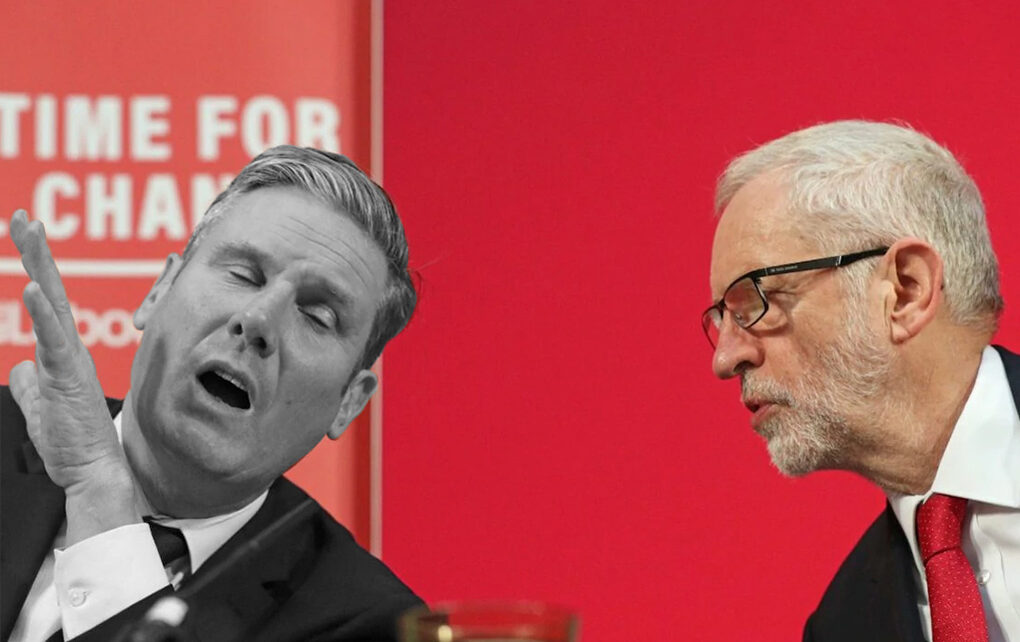In 1844 Marx and Engels wrote “A spectre is haunting Europe...” as the opening line of The Manifesto of the Communist Party. They continued “The spectre is communism”. If I was to repeat those words today I might say: “A spectre is haunting left politics in Britain. The spectre of the Labour Party.” It is clear that the Labour Party, like one of the dementors in Harry Potter, suck the oxygen out of political debate. By which I mean that before those on the left can move on, they have to reckon with their attitude to Labour.
Many on the left never believed that Labour was anything than a diversion from real politics, and whilst they temporarily ceased hostilities during Corbyn’s leadership, their instincts were always to see electoral politics as in opposition to the class based, often trade union based, struggles that could effectively challenge modern capitalism.
On the other hand, the Labour Party has always offered a home to those who believe, largely because they want to rather than that they have any evidence, that real change could only be achieved through parliamentary legislation. Thousands upon thousands of activists who proudly proclaim their socialism have spent a good deal of time and effort supporting a Labour Party that has arguably done more to damage socialism than to take it forward.
Revolution
On the other hand, the self proclaimed “revolutionary left” have formed smaller parties: the Socialist Workers Party, Workers Revolutionary Party, Militant (now the Socialist Party), the various configurations of the Communist Party, Workers Power, the list goes on. All these parties have one thing in common and that is, in one form or another, they all claim to be Marxist. But also, and they might not want to admit this, they have been parasitic upon the Labour Party. Swarming around it, denigrating it, but crucially seeking to lure its members away from futile reformism toward the class-based, revolutionary politics they all practice.
John Callaghan, an academic, wrote a book called The Far Left In British Politics in 1987. He is exceptionally hostile to the left, particularly outside the Labour Party and much of what he says has to be read in that light. Nonetheless, he makes an interesting point in his chapter on Militant, the most successful of the entryist groups. He notes: “Militant’s disdain for its rivals is no stronger than the hubris with which it describes itself…it represents the conviction that to qualify as a genuine Leninist party it is necessary to possess a monopoly of truth and prescience.”
Whilst Callaghan is entirely dismissive of the activities of the left his critique is not without some merit. The failure of much of the British left has not been so much in failing to foment revolution. But, rather their inability to work constructively together to build coalitions without resorting to dogma the minute the battle is won. They are not entirely self-obsessed, of course. Militant had great success in Liverpool and as a leading light in the anti-poll tax campaign. The Socialist Workers Party were instrumental in a number of strikes and were the forerunners of the Stop The War Coalition, now led by members of Counterfire who themselves split from the SWP in 2010. My point is not that these groups have no place or use but rather that their considerable organisational heft is focussed foremost on recruiting members to their own organisations. Organisations for whom democracy amounts to the ability to vote for a ‘slate’ of those favoured by the organisations leadership.
Back to reform?
So, what does all this mean for those of us who favour unity but reject both reformism and Marxist-Leninism? Immediately I feel the need to clarify that statement as it is likely to draw criticism from both those still in Labour and members of the revolutionary parties. If we reject reformism, it does not mean we reject reforms. As I wrote a couple of weeks ago it would be a strange position for somebody who professes an interest in class politics to oppose reforms which alleviate the conditions of working class people. By the same token rejecting the organisations purporting to be Marxist-Leninist does not mean that we reject Marxism (or at least a version of it). It is worth remembering that when Marx was asked about the proliferation of communist groups claiming to be Marxist he famously said “All I know is I’m not a Marxist”.
So, what are we rejecting? Since we launched the online discussion group there has been considerable debate among those involved in the private groups we set up mainly to distribute the Zoom meeting details. Different groupings have pursued different questions depending on the interests and other affiliations of those involved. What I have found interesting is that it did not take long for people to start to adopt contradictory positions and to passionately defend one position against a rival one. Occasionally, this has spilled over if not quite into acrimony into some barbed comments about how the holder of one view has little idea what they are talking about.
Let me be clear here. We are trying to establish a grass roots discussion group and it was, more or less, inevitable that people involved would discuss things, that they would take up opposing positions and that they would seek to establish that they are right meaning, by definition the other person is wrong.
Occupy or vote?
One interesting little diversion involved a proposal to occupy parliament. This became counter posed to establishing a new left wing political party. The debate comes down to direct action versus electoralism. Personally, in a pandemic I don’t want to get arrested with 6 other people storming the House of Commons and as anybody who has been following this blog will know I don’t believe that an electoral party to the left of the Labour Party is a viable option. But, I also don’t see these as two mutually exclusive options.
As we go forward if enough people want to form a direct action group I would support their right to do so. If others felt we should stand candidates, I’d support that too. They are simply not opposed. Some people would support one or the other, some would support both and some would support neither. At this early stage of our development we couldn’t even agree a common hashtag we are some way from storming the citadels of power either physically or through the ballot box. Is it not possible that the same movement could support both options?
What the “dispute” shows is a major weakness of left politics. In simple terms we are accustomed to seeing politics as oppositional and once sides are drawn you can only be on one side of the line. This is part of the legacy handed down to us by the Marxist-Leninist left. There simply is no room in such a politics for agreeing to disagree. This is one of the reasons why the left splinters into factional fighting. Jeremy Corbyn, shortly after he won the Labour leadership, said that he wanted to do politics differently. Sadly, both the media and the PLP undermined the project. But, as with many things, his instincts were right. We can’t keep repeating the mistakes of the past and learning nothing from them. The sectarian politics of the past have not taken us forward as a movement because although ‘we are many’ we are many who mostly refuse to get on with one another.
Principles
Agreeing to disagree on tactics does not mean abandoning our principles. It does not mean, for example, tolerating racism, sexism or classism. It does not mean turning a blind eye to the oppression of vulnerable individuals. But it does mean that whether you pursue those goals in or out of a party, through direct action or the ballot box, or simply by engaging on social media nobody else has the right to tell you that your way is wrong and you must pursue their favoured strategy or you are a Tory enabler or worse. It is time for the left to leave the politics of the playground behind.
Too often the left have splintered around points of principle that could easily co-exist. The Labour left refuse to talk to the left groups outside of their party. The left groups refuse to even acknowledge each other, let alone talk. Can anybody tell me how this is helping to transform society?
Nobody, not Jeremy Corbyn, not Karl Marx, and especially not me, has a monopoly on being right. Everybody makes mistakes. Some of those mistakes are minor – getting a figure wrong in a debate about taxation, for example; some are major – supporting a candidate who claims to be for unity but who once in power spends a good deal of energy attacking anybody who is to the left of them. But, there is a frightening tendency among people on the left to see mistakes, even minor ones, as failures of principle. To reduce everything to a matter of principle.
Purging dissent
This is a weakness of left politics. It means that joining a left organisation becomes akin to taking an oath of loyalty to the one true socialism. Every position, every debate, every strategy is handed down to you and your role is simply to spread the word. Dissent is not allowed in such a scenario for dissent is treated as a weakness. Most of this has nothing to do with politics but is organisational in origin. And this tendency to disparage dissent has its mirror in Labour who might like to think of themselves as the adults in the room but in reality in the hands of the right have no interest in freedom of speech or dissenting positions. After all, divided parties don’t win elections, do they? Better to purge the dissenters early in an example of strong leadership imposing unity.
For the so-called far left purging dissent is made easier by avoiding democracy altogether. The leading members, usually a Central Committee elected by nobody, decide the policies and strategies. The role of members is to take those policies out to the wider movement. But, what type of socialism is it that allows no debate? What type of socialism commands its followers to only follow, yet expects them to be able to lead in the wider World? If this is socialism, all I know is that I’m no socialist.
It is this spectre of Labour that has in many ways caused the polarisation among the British left. The choice became join Labour and spend time fighting the right for control of the party. Or, renounce Labour and join a revolutionary group who, whilst far more focused on socialist politics, see ordinary members as foot soldiers to take a message decided by others out into the World. Of course there was always a third option which was to absorb yourself into community or trade union politics. It was as if you could have reformism, revolutionism or trade unionism but no combination of the three.
Does it have to be this way? Deciding broad principle that any socialist could support should not be an impossible task. The strategies and policies required to achieve these principles can be the subject of debate and difference. But that doesn’t mean that you have to end up hating others if your view does not win out. It just means trying harder to win the arguments next time. And, people are far more likely to respond positively to those arguments if you have shown a willingness to engage in meaningful debate previously, and accepted that sometimes it is okay to agree to simply disagree. That’s democracy!
Whilst you’re here. If you like what you’ve read please subscribe by using the widget at the top left.
To get involved in the project discussed in this blog either DM me on Twitter, leave a reply on Facebook or email me at the address above.
Can I encourage you to listen to The Socialist Hour podcast. Episode 2, featuring discussions with academic socialist Russ Jackson, NHS campaigner Ann Marcial and the Dangerous Globe is on Mixcloud now: https://www.mixcloud.com/SocialistHour/socialist-hour-episode-2-walls-come-tumbling-down/
And for a great listen, I recommend Project Coups regular shows on Mixcloud: https://www.mixcloud.com/incapablestaircase/gloo-1200-16022021/
You can sign up for the Peace and Justice Project headed by Jeremy Corbyn here https://thecorbynproject.com
Please write to Julian Assange who is still in Belmarsh: https://writejulian.com
Socialist reading: Please support the following socialist blogs
Charlotte Hughes https://thepoorsideof.life/
Rachael Swindon http://rachaelswindon.blogspot.com/
Jonathan Cook https://www.jonathan-cook.net/blog/
Kitty Sue Jones: https://politicsandinsights.org
And avoid the MSM and support these left wing sources instead:
Dangerous Globe: https://dangerousglobe.com
The Canary https://www.thecanary.co/
Skwawkbox https://skwawkbox.org/
Counterfire https://www.counterfire.org/
Morning Star: https://morningstaronline.co.uk
Byline Times: https://bylinetimes.com
Support workers struggles by using the brilliant interactive strike map: https://strikemap.wordpress.com/2020/12/18/strike-map/





